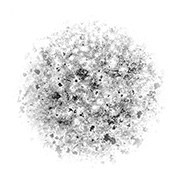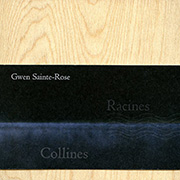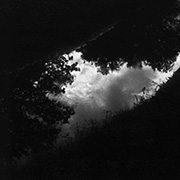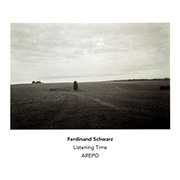 Huw Morgan: Melos [Sawyer Editions]. Life’s been a little crowded lately so I’ve been finding some breathing space. Huw Morgan’s Mostly Slow Organ Music recitals have been happening for a while now, featuring his own compositions amongst others. His Melos compositions have been spreading out across the country for ten years now: this album features organs from churches in Bristol, Dundee and Catford. They’re not exactly performances on the organ, but with the instrument; Morgan treats each iteration of the piece as a site-specific work, taking long samples of individual stops and composing them into a single chord that gradually transmorphs through electronic manipulation into a second chord. Extraneous sounds and impurities in the mechanism are preserved, and the sliding tones are too slow to be perceptible as the music’s subject. The result is a Zen-like drone, empty yet full, the well-composed sort that hold your attention without seeming to do anything. When you start to lock in on it you become fascinated by the near-imperceptible change in intonation and the multitude of sonic ramifications it brings about. Five versions are presented here, the shortest being eight minutes and the longest (twenty) being only an excerpt from a longer piece. Hopefully more recordings become generally available.
Huw Morgan: Melos [Sawyer Editions]. Life’s been a little crowded lately so I’ve been finding some breathing space. Huw Morgan’s Mostly Slow Organ Music recitals have been happening for a while now, featuring his own compositions amongst others. His Melos compositions have been spreading out across the country for ten years now: this album features organs from churches in Bristol, Dundee and Catford. They’re not exactly performances on the organ, but with the instrument; Morgan treats each iteration of the piece as a site-specific work, taking long samples of individual stops and composing them into a single chord that gradually transmorphs through electronic manipulation into a second chord. Extraneous sounds and impurities in the mechanism are preserved, and the sliding tones are too slow to be perceptible as the music’s subject. The result is a Zen-like drone, empty yet full, the well-composed sort that hold your attention without seeming to do anything. When you start to lock in on it you become fascinated by the near-imperceptible change in intonation and the multitude of sonic ramifications it brings about. Five versions are presented here, the shortest being eight minutes and the longest (twenty) being only an excerpt from a longer piece. Hopefully more recordings become generally available.
 Ben Richter: Dissolution Seedlings [Sawyer Editions]. The ensemble House on Fire consists of three musicians, at least in this instance; they play pianos, but also melodicas, a pump organ, percussion and a cello. Dissolution Seedlings is a nearly-hourlong work for this odd ensemble, divided into fourteen (“and a half”) movements. Offset against this information is the curious way the music dissipates its activity, marking out time more than passing through it. Richter speaks of rhizomes (more vegetal than anti-Oedipal) in his notes, but the piece struck me most as a way of finding music that endures past the point when all momentum has been exhausted. It reminded me a bit of Charlie Usher’s An assembly – a forty-five minute piece composed of a hundred-plus tiny fragments – but whereas that piece uses brevity as a means of negating substance, Dissolution Seedlings creates space and hesitates to fill it. Each movement is its own pause, where waiting is an end in itself. Small gestures emerge almost by default, and with each change of state from one section to the next, House on Fire does as much nothing as they can possibly sustain for the duration.
Ben Richter: Dissolution Seedlings [Sawyer Editions]. The ensemble House on Fire consists of three musicians, at least in this instance; they play pianos, but also melodicas, a pump organ, percussion and a cello. Dissolution Seedlings is a nearly-hourlong work for this odd ensemble, divided into fourteen (“and a half”) movements. Offset against this information is the curious way the music dissipates its activity, marking out time more than passing through it. Richter speaks of rhizomes (more vegetal than anti-Oedipal) in his notes, but the piece struck me most as a way of finding music that endures past the point when all momentum has been exhausted. It reminded me a bit of Charlie Usher’s An assembly – a forty-five minute piece composed of a hundred-plus tiny fragments – but whereas that piece uses brevity as a means of negating substance, Dissolution Seedlings creates space and hesitates to fill it. Each movement is its own pause, where waiting is an end in itself. Small gestures emerge almost by default, and with each change of state from one section to the next, House on Fire does as much nothing as they can possibly sustain for the duration.
 Gwen Sainte-Rose: Collines / Racines [By the Bluest of Seas]. No need for philosophising or head-scratching here. This is just Sainte-Rose straight up with a cello and a loop pedal. It’s bright and colourful and seems all so clean and simple, swear it’s all been done before but no direct comparison immediately comes to mind. That’s not the sort of thing you should be worrying about anyway when this is so pleasant to listen to. Sainte-Rose says she’s rhapsodising the Belgian landscape, but I think we can all invest these two long, drifty pieces with our own ideas of home.
Gwen Sainte-Rose: Collines / Racines [By the Bluest of Seas]. No need for philosophising or head-scratching here. This is just Sainte-Rose straight up with a cello and a loop pedal. It’s bright and colourful and seems all so clean and simple, swear it’s all been done before but no direct comparison immediately comes to mind. That’s not the sort of thing you should be worrying about anyway when this is so pleasant to listen to. Sainte-Rose says she’s rhapsodising the Belgian landscape, but I think we can all invest these two long, drifty pieces with our own ideas of home.
 Marti Epstein: For Jack [Sawyer Editions]. The “Jack” referred to here is Jack Yarbrough, the pianist playing this long, solo work. Yarbrough’s been heard in a few other recent recordings, notably Timothy McCormack’s mine but for its sublimation, another work written for him. At that time, I wrote that “he has a gift for coaxing prolonged sounds out of his instrument”; that quality applied here too. Unlike the other pieces in this review, For Jack doesn’t exactly create mental spaces for contemplation, rather it crowds them out and then colours those spaces with its own, foreboding mood. For a long time, the piece dwells upon dark clouds of low chords, which ultimately burst out with sudden violence. Eventually, the mood breaks a little, opening into higher registers and more open sounds, but the chords are still dense and brooding until they finally fragment into slow counterpoint of higher single notes. My description makes it sound cheesy, but Epstein steers a steady course between cheap drama and cold process, making the progression seem intuitive and unforced. Yarbrough emphasises this with an interpretation which properly equates intuition with nature, merging the austere and forbidding with echoes of the pastoral.
Marti Epstein: For Jack [Sawyer Editions]. The “Jack” referred to here is Jack Yarbrough, the pianist playing this long, solo work. Yarbrough’s been heard in a few other recent recordings, notably Timothy McCormack’s mine but for its sublimation, another work written for him. At that time, I wrote that “he has a gift for coaxing prolonged sounds out of his instrument”; that quality applied here too. Unlike the other pieces in this review, For Jack doesn’t exactly create mental spaces for contemplation, rather it crowds them out and then colours those spaces with its own, foreboding mood. For a long time, the piece dwells upon dark clouds of low chords, which ultimately burst out with sudden violence. Eventually, the mood breaks a little, opening into higher registers and more open sounds, but the chords are still dense and brooding until they finally fragment into slow counterpoint of higher single notes. My description makes it sound cheesy, but Epstein steers a steady course between cheap drama and cold process, making the progression seem intuitive and unforced. Yarbrough emphasises this with an interpretation which properly equates intuition with nature, merging the austere and forbidding with echoes of the pastoral.
 Ferdinand Schwarz: Listening Time [Another Timbre]. I don’t know anything about Schwarz and neither did the label proprietor before he heard this, it seems. A work for clarinet, electric guitar, accordion and cello, played by the AREPO ensemble, it’s an unexpectedly beguiling piece. Listening Time starts out self-effacing and innocuous but it grows on you after the first hearing. AREPO plays a single chord, its pace seemingly dictated by the clarinettist’s breath. Over each iteration, the chord spreads out a little but mostly it deepens, with subtle touches that hint at possible voice-leading. Without the need to “go” anywhere, composer and musicians settle into establishing where they already are and what that might entail. It’s a piece you need to listen into, much in the same way as the musicians of AREPO appear to. Schwarz describes as improvisation, petrified in time, and credits the AREPO musicians jointly with composition. The ensemble sounds perfectly matched to the piece, producing softly luminous sound as a single complex instrument, with the idiosyncrasies of the individual instruments sublimated into a greater whole.
Ferdinand Schwarz: Listening Time [Another Timbre]. I don’t know anything about Schwarz and neither did the label proprietor before he heard this, it seems. A work for clarinet, electric guitar, accordion and cello, played by the AREPO ensemble, it’s an unexpectedly beguiling piece. Listening Time starts out self-effacing and innocuous but it grows on you after the first hearing. AREPO plays a single chord, its pace seemingly dictated by the clarinettist’s breath. Over each iteration, the chord spreads out a little but mostly it deepens, with subtle touches that hint at possible voice-leading. Without the need to “go” anywhere, composer and musicians settle into establishing where they already are and what that might entail. It’s a piece you need to listen into, much in the same way as the musicians of AREPO appear to. Schwarz describes as improvisation, petrified in time, and credits the AREPO musicians jointly with composition. The ensemble sounds perfectly matched to the piece, producing softly luminous sound as a single complex instrument, with the idiosyncrasies of the individual instruments sublimated into a greater whole.
